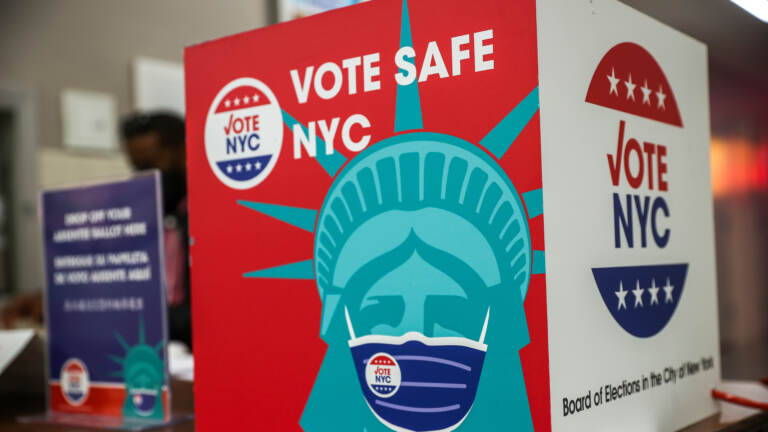What 2021’s recent elections tell us about voting in 2022 and beyond

New Yorkers are casting their votes for the November 2nd General Election and Mayoral Election in New York City, United States on November 02, 2021. (Photo by Tayfun Coskun/Anadolu Agency via Getty Images)
Pick any election truism, and 2021’s elections earlier this month may have killed it.
Making voting easy is a death sentence for the Republican Party? Nope.
Mail voting is a slam-dunk for Democrats? Not so fast.
The American voting system is in the middle of a seismic shift, as state legislators propose and pass a flurry of laws restricting and expanding voting, and candidates navigate an electorate where a sizable portion of voters think the whole process is rigged.
Last week’s elections gave us our first insights into this new playing field in 2022 and beyond:
1) New York, New York
Governor’s races in Virginia and New Jersey got all the attention, but elections experts were most shocked at results out of New York.
Voters in the state soundly rejected two ballot proposals that would have allowed for same-day voter registration and no-excuse absentee voting in future elections.
Both reforms are fairly commonplace in the U.S. at this point, with 20 states allowing for same-day registration, and at least 34 states allowing for no-excuse absentee voting, according to the National Conference of State Legislatures.
“No-excuse absentee balloting is a common reform now,” said Paul Gronke, a political science professor and expert on early voting at Reed College. “I would have assumed that New Yorkers would have voted for convenience and ease and access.”
But Americans’ confidence in voting by mail has dwindled since the start of the pandemic, largely due to misinformation about fraud.
Voter fraud has never been shown to be a widespread or meaningful issue in American elections, and experts and officials of both parties say the 2020 election was one of the most well-administered elections in American history.
In April 2020 a Pew Research Center poll found overwhelming bipartisan support for all Americans being able to request an absentee ballot without an excuse.
But former President Donald Trump has spent the past 18 months falsely railing about the security of mail ballots, and that rhetoric has had a noticeable effect, especially on how Republicans feel about the voting method.
To get the absentee ballot question onto the ballot at all, it had to be referred by New York’s state legislature twice.
Gronke noted that in 2019 when it first came to a vote, 75% of the legislature’s Republican members voted in favor of it, but in 2021, just 32% did.
“I don’t know what’s going on in the head of those legislators, but I think a good hypothesis would be the messaging from the ex-president,” Gronke said.
New York’s election results however raise the question of whether Trump’s campaign against voting by mail has had an effect on how Democrats feel about it, too.
Fewer than 40% of voters voted yes on the absentee ballot question this month, in a state where Joe Biden won 60% of the votes last November.
“There was a very heavy campaign from the opposition basically saying that these would lead to voter fraud, that these would be bad for New York state voters,” said Jennifer Wilson, the deputy director of the League of Women Voters of New York. “I think that really scared people, regardless of their party affiliation.”
Republicans in the state spent millions on a “vote no” campaign, while the chairman of the state Democratic Party said in an interview last week that his organization spent no money educating voters on the ballot questions.
That lack of voter education showed, said Caitlin Brimmer, who worked the polls in Brooklyn on Election Day.
“I saw a lot of people looking at their ballots, looking at the questions surprised they were on there,” Brimmer said. “A lot of people were like, ‘Will my vote still count if I don’t answer these?’ ”
More than 11% of voters left the no-excuse question blank, according to the most recent returns from the State Board of Elections.
To Amber McReynolds, a former local election official who started the National Vote at Home Institute, the lesson was of 2021 is that thanks to the rhetoric and disinformation around voting, nothing can be taken for granted, even in a state dominated by Democrats.
“When you don’t educate the public on what they’re voting for, it’s a good way to quickly lose on anything,” said McReynolds.
2) For Republicans, easy ballot access might not be so scary
For years, it went mostly unspoken.
Then, last year, as states rapidly moved to expand voting options in response to the pandemic, Trump said what has been clear for a while now: many Republicans fear that higher voter turnout means trouble for the Republican Party.
“MAIL-IN VOTING WILL LEAD TO MASSIVE FRAUD AND ABUSE. IT WILL ALSO LEAD TO THE END OF OUR GREAT REPUBLICAN PARTY,” Trump tweeted in May.
In an appearance on Fox and Friends earlier in the spring, Trump talked about reforms that could lead to “levels of voting that if you’d ever agreed to it, you’d never have a Republican elected in this country again.”
Political scientists and voting experts have long argued high voter turnout doesn’t give either part an advantage and the outcome in Virginia made that clear.
“That election showed these reforms don’t benefit one side over the other,” said McReynolds. “They benefit all electors. And then it’s up to the campaigns to articulate their message.”
Since the last governor’s race in 2017, Virginia has implemented automatic voter registration, no-excuse absentee voting, ballot drop boxes, as well as rescinded its requirement for voters to show a photo ID to vote.
All that helped turnout soar to record numbers: more than half a million more people voted this year than in 2017, meaning turnout increased by more than 25%.
And a Republican won.
3) Trump isn’t going away, and neither are “integrity” concerns
Glenn Youngkin won the governorship in Virginia, a state that went to Biden by 10 points, while walking a tightrope on voting issues.
He waited until after he had secured the Republican nomination for governor before he acknowledged that Biden was the legitimate winner of the 2020 election.
And he called for election audits in the fall, at a time when Republicans in other states used the term “audit” to inject doubts about the 2020 election. Virginia already conducts annual election audits.
Gronke, of Reed College, said it’s clear most Republican candidates see their political futures tied to Trump, and by proxy, will feel pressure in 2022 to parrot his false claims about election fraud or at the very least signal a sympathy to those ideas.
A Reuters analysis this fall of candidates running to be the lead election officials in five swing states, for instance, found that 10 of the 15 candidates running in Republican primaries either “declared that the 2020 election was stolen or called for their state’s results to be invalidated or further investigated.”
“It’s a strategy to fire up [Trump’s] base, keep them close, keep them voting with the Republican Party,” Gronke said. “Unfortunately, it’s also deeply corrosive and damaging the future of American democracy. And it’s just very hard to watch leading political figures put their own personal political ambitions ahead of American democracy. ”
Polling finds that Republican voters are following suit too. A recent NPR/PBS NewsHour/Marist poll found that just a third of Republicans trust elections in the U.S.
9(MDAzMzI1ODY3MDEyMzkzOTE3NjIxNDg3MQ001))




